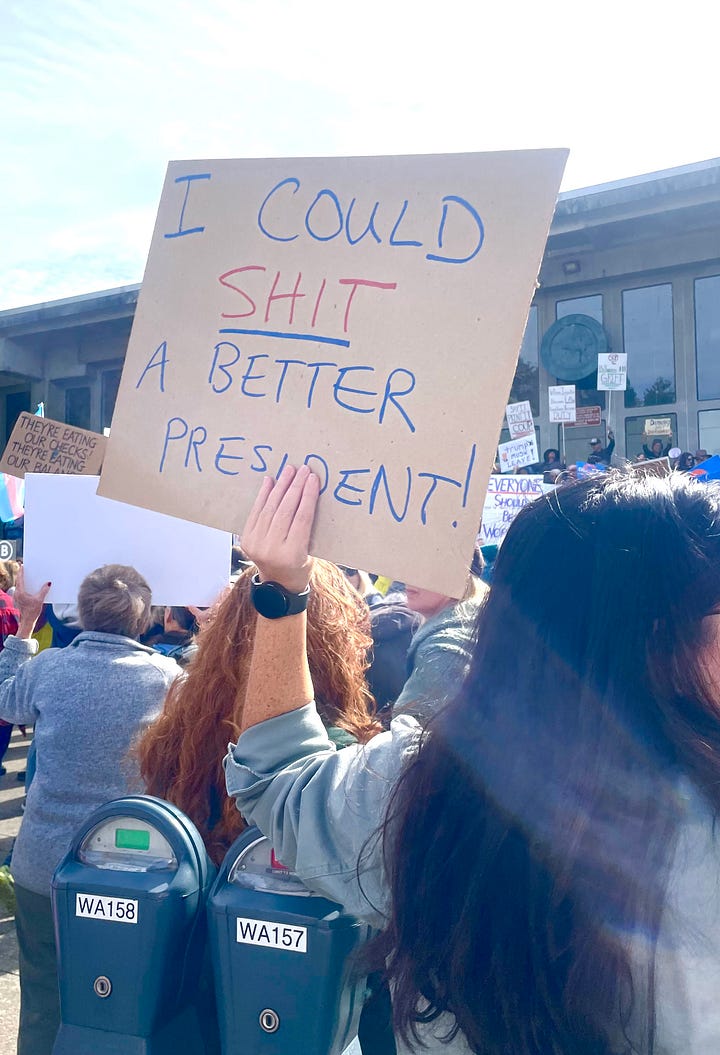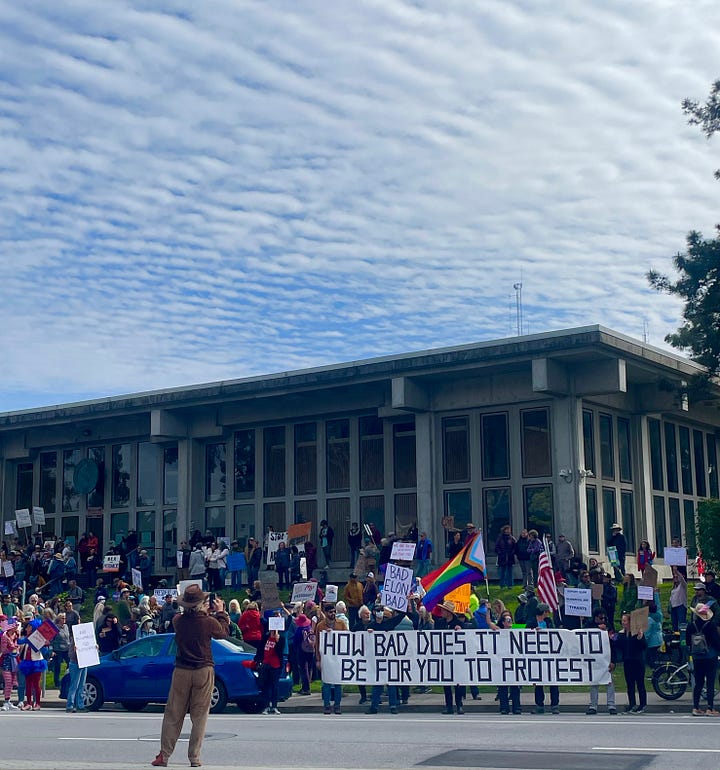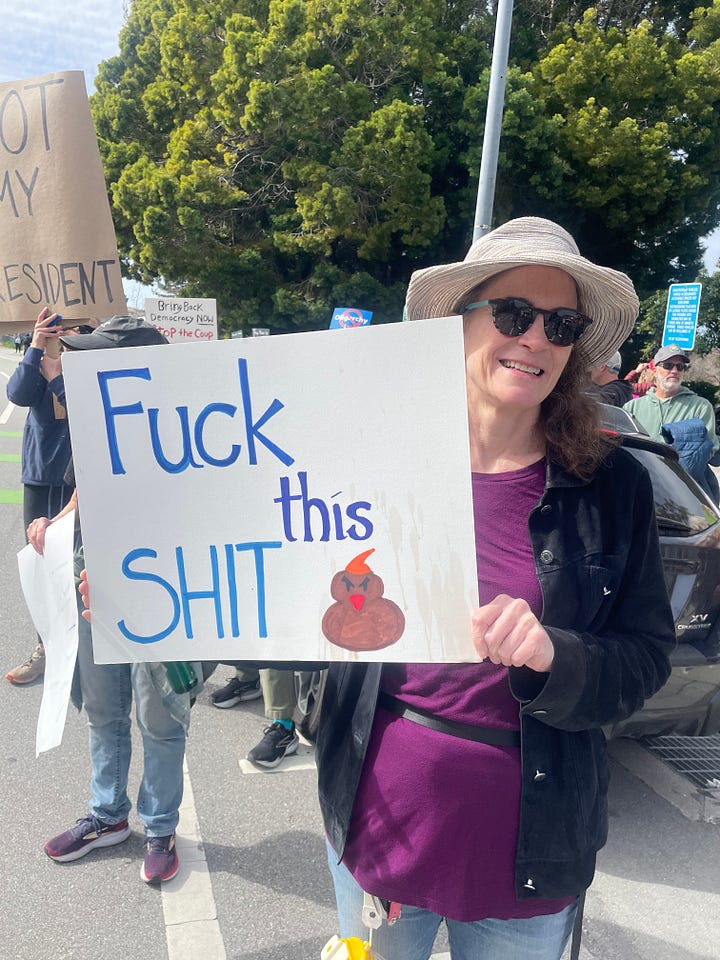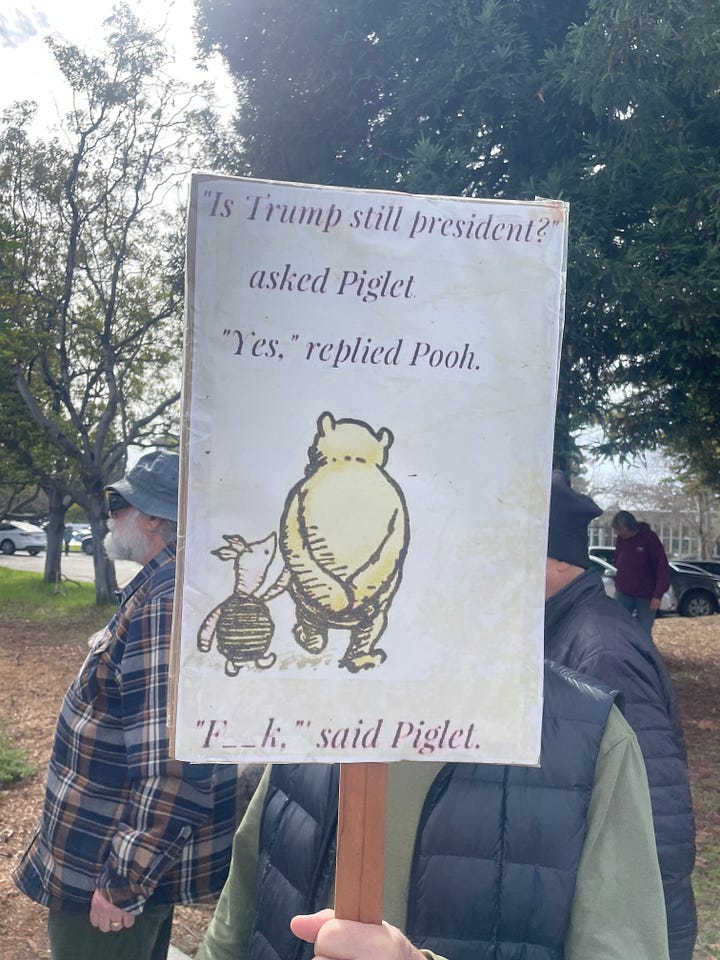How Angry Do We Get to Be?
Is it unspiritual to be angry about the state of the nation at this time? Should we be angry? How angry? And, how do we avoid the trap of chronic anger?
This is the third in a series of essays on emotional and spiritual resiliency at this incredibly challenging time. Please also see The Inner Mountain Mandate and Love is Free, Love is Ours.




In response to some of my writings around the current, very challenging timeline here on Earth, and ideas of innate resilience, folks have been asking questions. Here is one, from a spiritual-psychology colleague.
Q: I spent many of my college years angry at "the system.” I don't want to feel that chronic pissed-offness again and am wondering if it helps our resilience grow stronger and our healing to be angry and act out of anger with its feeling of empowerment or if that's a slippery slope? I enjoy your work … —Allan
Dear Allan:
I recently wrote a social media post to my friends in Europe and around the world. I know that some people follow me because they know me as a “Three Principles,” spiritual-psychology teacher of three decades now. I know some have likely been disappointed or surprised to find political posts at my accounts and, sometimes, expressions of sadness, fear, disgust or anger. In this last post, I wrote that large groups of people in the United States were afraid and even “terrified” of what was happening in our nation.
Even as I wrote those words, I felt a conditioned response arise in myself–a sort of having to be “brave” to share those words–and a knowing that some people might find me less than spiritual for having expressed fear, or for giving any reality at all to fear. But fear is precisely what is happening here at a very large scale–whatever opinion one may have of fear. (And, indeed, I quickly received a comment about how I was “in my thinking.”)
All this relates to the apparent tamping down of our overall humanity with what I sometimes call an “overlay” of spirituality or spiritual ideas. One of these ideas is that once we have gained some spiritual insight, we (especially anyone who purports to call themselves a teacher, leader, practitioner, author, global speaker, etc.) then always–or mostly always–walk around in a blissful state or lovely feeling, always being kind.
Therefore, one might pretend that one is never angry, afraid, sad, nor in despair, anxiety nor any other “negative” emotion. Or one might share a very slight personal example, but never actually really show one’s anger or sadness, etc. in raw form.
… anger, to me, is a flame that can easily burn us and its use must be conscious. We are discussing “controlled burning” in California these days. Controlled burning can be dangerous, because it can get out of control and burn much more than one would want. I see anger that way. There is a purpose for it, but one must be careful.
In my personal experience, and knowing many other teachers and hearing about even very famous spiritual teachers (from many backgrounds) and their angry outbursts at times, this is simply not true. With all due respect, my first significant spiritual teacher (and, I think, yours too, Allan!), Sydney Banks, became very angry at times. I also experienced him, in person, as sometimes sad or disappointed. He could be sarcastic. Sometimes even a little mean.
So first, I will say that one of my recent missions has been to try to pierce this illusion of what I call “spiritual zombie-ism” in which practitioners, especially, seem to want to “walk above” the rolling and often turbulent tides of our humanity and present as sort of peaceful and deep all the time.

This especially started to get to me with the first election of Donald Trump to the U.S. presidency. Now, I am mindful that many people were duped by Trump, but it was pretty clear from his public statements that he was not kind, nor compassionate, nor wise and that he was in fact, capable of great cruelty. One of the most senior teachers of the Three Principles—a person I respect greatly—told me privately they thought he was “crazy.” I believe Mr. Banks would have said the same.
The implications of such a person in the highest office in the land in likely the most–or one of the most–powerful nations on Earth was not lost on me. And yet, I saw very few of my colleagues stating such publicly. I was deeply concerned for my nation and I myself did not know how to express any of this in a “spiritual” way. I was looking for role models. I turned to Gangaji, also a very significant spiritual teacher for me. She was the first one to ask me why I would have a problem with fear.
But Gangaji, although she was very open about her thoughts on the Trump Administration, was not on a mission about this. She had her own mission already.
And so, I decided I would need to be my own leader. Not that there haven’t been others. I suppose I mean “modern day.” I mean, people for whom there is deep spiritual grounding or understanding, and also an awareness of our current, physical reality and the long history of how large-scale social and political change has happened in this nation and around the world. It has taken people getting angry and “fighting” to make that change. These movements were often conducted non-violently and even with many loving and spiritual words, but even Dr. Martin Luther King, Jr. could become angry. Even Jesus could!
I must confess that over the past few years I have been gravely disappointed with the white moderate. I have almost reached the regrettable conclusion that the Negro's great stumbling block in his stride toward freedom is not the White Citizen's Counciler or the Ku Klux Klanner, but the white moderate, who is more devoted to "order" than to justice; who prefers a negative peace which is the absence of tension to a positive peace which is the presence of justice; who constantly says: "I agree with you in the goal you seek, but I cannot agree with your methods of direct action” … Shallow understanding from people of good will is more frustrating than absolute misunderstanding from people of ill will. —from Marin Luther King Jr’s, “Letter from a Birmingham Jail.”
It seems to me that anger is part of the full spectrum of human emotions and that anger is also not something to be afraid of. But, like you, I do believe it is something to be very cautious–or vigilant–about.
Being Vigilant About Anger
Your question opened up a lot of thoughts for me. First, I will say: there is nothing sinful about anger. It’s a strong emotion that normally includes some level of blame for someone that is not yourself. Generally speaking, as you say, it starts to wear on one’s internal “systems.”
Also, because blame is projected outward, when we are trapped in anger, we miss those psychic seeds inside of each of us that are the same or similar to what we are angry about in others, i.e. we can all be greedy. We can all be selfish. Sometimes, we can each of us be cruel. If we are not vigilant about turning our gaze inward as well as outward, we will never create a just and peaceful society. A just and peaceful society must be created by fundamentally just and peaceful humans.
Therefore, anger, to me, is a flame that can easily burn us and its use must be conscious. We are discussing “controlled burning” in California these days. Controlled burning can be dangerous, because it can get out of control and burn much more than one would want. I see anger that way. There is a purpose for it, but one must be careful. On the other hand, when anger, like too much underbrush and flammable growth is allowed to grow and fester without expression, a dangerous conflagration is likely imminent.

But yes, too much anger, either suppressed or expressed, is toxic.
I hear you.
On the other hand, I observe that some spiritual communities make a demon out of anger. Anger, for many such groups, means one is not at a “high level” of consciousness, one is not doing things right, one is not “spiritual.”
I have also received comments on my social media posts that I sound “angry” and the clear implication is that I have lost my center and I am off track. The thought system here is: Anger is bad. Always.
This makes me angry! :) Seriously, I get angry that people want to “tone police” others based on what I see as false ideas about spirituality. I feel bound in chains and only want to bust them loose and shake them off.
Then there is a transference of this idea about anger (not good) to activism in general, because activism is sometimes about saying No! And this implies anger, conflict, confrontation. Someone recently said to me: “I am not an activist; I am a pacifist.”
And I told her, “Well, you can certainly be an activist and a pacifist.”
Allan, the question you pose is so important, because it speaks to 1) whether or not people become “active” at this time and 2) whether or not their activism can be sustained, or even effective and 3) whether or not anger is allowed in one’s activism.
But What Is “Activism?”
And all this begs another question, which is: What is “activism?”
From actual, armed, revolutionary struggles and all-out wars to mass civil disobedience to sending money to candidates or to get-out-the-vote campaigns, or volunteering for ecological or rights groups, activism includes a broad spectrum of engagement.
Linking activism to anger or even conflict, necessarily, seems like a leap when some folks are literally writing postcards at home with a cup of tea or glass of wine, a plate of brownies and a group of friends trying to get people out to vote. Perhaps it is in-the-streets activism that people equate with anger. And, often, the issues that might get people in the streets are pretty enraging.
Overall, as you mention, I don’t think anger can be sustained long term without damage to the one who is angry.
But I also think that understanding the ignition power of anger can be important. Anger can move one from a subservient or victim position into empowerment; anger can wake people up. When someone is angry, I generally pay attention, especially if that person is not often angry. I remember that during the Black Lives Matter explosion of 2020, a video of a Black woman, Kimberly Jones, an activist and author, responding to people being upset about “riots” or break-in’s at a handful of retail stores, and her absolute devastation and, yes, anger really forced me to pay attention to what she had to say. Because of her anger, I went and researched the Tulsa and Rosewood race massacres and the violent destruction of Black Wall Street. Imagine ranting on about breaking into retail stores, compared to the violence, bloodshed, death and absolute mayhem of these “white riots.”
So, I think anger is OK. Useful. Sometimes inspiring.
But if anger becomes an ongoing habit or lens for viewing the world, then I think we have a problem, as you say. The first problem–as mentioned–is that we become less inclined to self-reflect. The second is that we burn out, because anger is not sustainable and not terribly creative or insightful as a state of mind; and it is, essentially a “negative” emotion, meaning: a hard emotion to bear, hard even on the body, the heart, the blood pressure. The third is that it becomes our “Go To” vs. our “sometimes” perspective.
I take issue with activists who bring anger into every conflict or movement. Everyone becomes an enemy. Everyone becomes the opponent. What this means then is that we lose our capacity for influence, because you and I know that when we are angry with someone, they are less inclined to listen to us.
I take issue with activists who bring anger into every conflict or movement. Everyone becomes an enemy. Everyone becomes the opponent. What this means then is that we lose our capacity for influence, because you and I know that when we are angry with someone, they are less inclined to listen to us. They might at first, or once, but if we carry on in anger, they will begin to retreat, defend, or attack back with their own anger. Listening and influence have flown out the window.
I also observe that when anger becomes our “default” in activism, the blow torch of anger is as easily turned on our comrades, fellow activists, supporters and would-be supporters as it is on those who are knowingly lying and hurting people and our ecology.
We have all heard of the “circular firing squad” on the Left. I believe that friendly fire comes from fear, because anger often comes from fear. Rather than explore our fears and have real dialogues, with real listening and mutual understanding (and therefore, shifts in consciousness and increased camaraderie) we alienate our would be allies and split movements, because we keep others at a distance through anger.
I was also thinking about anger today as of being one of two kinds:
Anger as arising from our personal thought system. Meaning, someone does something “outside” of us and we become angry because we are triggered. Maybe this person really didn’t do anything so terrible. We do not know their point of view. Maybe they are really innocent, actually, of wanting or trying to hurt anyone. Yet, we generate anger because of our own issues, personal issues, past traumas. This kind of anger, to me, is ineffective, except as a wake up call for ourselves, to look and see what is happening inside ourselves. And then there is …
Anger arising because of a clear injustice. People can be angry about policies that hurt and dehumanize humans and/or that will hurt and dehumanize the planet, all species and our life support systems. This is the anger of empowerment. It does not need to rage on forever, and shouldn’t actually last that long. I have had the experience of being angry without really being angry. Have you? I have found myself at times expressing myself angrily because my innate intelligence seemed to think anger is called for in a certain moment. This kind of anger arises and then is gone again with little to no residue. Maybe this is what they call “righteous anger.”
Overall, I think we need to grow movements aligned with spiritual principles of oneness, unity and love. The authors and activists Adi Da, Satish Kumar, bell hooks, Grace Lee Boggs and adrienne marie brown all speak to this in their own ways. We can temper our anger because, in the end, they are us. We are humanity. To truly change society, we must somehow touch and change all, or most, of us. We cannot escape this interdependence and connection.
But also, we need movements that include the full spectrum of emotions. We can understand that protesting and even anger are about love and protecting people who are being attacked or who are vulnerable. We can allow ourselves anger without wallowing in anger, without making it our only tool. We can be vigilant to see where our anger is personal and where it is righteous and effective.
Wisdom moves contextually and arises freshly in each new moment. Is anger good or bad? It is neither. It moves–like every other thought and emotion–like the tides, and only we ourselves can know if we have begun to swim upstream, or against the tide too much.
We can notice that we go astray when we stop seeing other people, even political opponents, as human and capable of change. This understanding about humans is the root of the King and Gandhi nonviolence movements, which were really about (IMHO) nonviolence as a state of mind. I think nonviolence as a spiritual understanding comes from our deeper knowing that we are all connected, and to hurt another is to hurt oneself.
I want to note here that very few of us have access to the halls of power where decisions that hurt and even kill people in terrible ways are made on an almost daily basis. Therefore, sometimes, our expressions of anger or disgust are about waking up the populace. When people in power are actively hurting others, when they are likely sociopathic, the “struggle” and our expressions of anger may look very different than in a local city council chamber, for example.
I will end with the reminder that there are no rules.
Wisdom moves contextually and arises freshly in each new moment. Is anger good or bad? It is neither. It moves–like every other thought and emotion–like the tides, and only we ourselves can know if we have begun to swim upstream, or against the tide too much. The pain will be clear. You felt it. It stopped you.
Perhaps our lesson now, during these incredibly challenging times, is to release ourselves to be and feel fully free, to be willing to feel everything–anger, outrage, grief, sadness, and fear, as well as joy, hope, inspiration, creativity and our deep indwelling peace–and then move in the direction our hearts take us, no matter what.
Thank you for your question.
This is the third in a series of essays on emotional and spiritual resiliency at this incredibly challenging time. Please also see The Inner Mountain Mandate and Love is Free, Love is Ours.
Resources:
See links in text above. Please also see our Truth in Action and Spiritual Resilience categories at this Substack.
The following resources, mostly books, have been very present in my world for the last five or six months. I have been using them in my teaching and in my own reflections, and found all of them to be useful in helping me to think about, articulate and envision the kind of activism we need now. They may not seem, at first, terribly related to one another, but they are.
Angela Davis on “violence.” Video
The Next American Revolution, Grace Lee Boggs
Emergent Strategy, Adrienne Marie Brown
Prior Unity, Adi Da
Rest is Resistance, Tricia Hersey
All About Love, bell hooks
Radical Love, Satish Kumar
The Spark Inside, Ami Chen Mills
State of Mind in the Classroom, Ami Chen Mills
The Work of This Moment, Toni Packer
The Secret to Mental Health, George Pransky



Righteous Anger needs to be channeled into positive actions or else you are just a Debbie/Donny Downer who bitches all the time but does nothing to make the world a better place via change. I am spiritual and intellectual activist person and the two are not only not mutually exclusive but if a person is not upset or angry at injustice in their local or distant environments - they are in denial - a classic defense mechanism which can come in handy but is not healthy in the long term. Jesus was passionate and trashed the market which led to his being crucified. Many Buddhist masters are short tempered and do not suffer fools in a nice way. Sitting on the so called spiritual fence is a luxury of the comfortable bourgeoisie- something Buddhist scholar Thich Nhat Hanh understood being a anti-war and environmentalist crusader until his last breath in his 90s. As born again Christian, writer and philosopher CS Lewis pointed out - the battle of good vs evil is ever ongoing and as MLK once smartly said - "the arc of the moral universe is long but bends toward justice." Thus The fight for justice is lifetime commitment and yes - does take energy, sacrifice and civic duty to your community. Sitting on the sidelines hiding from heavy emotions leads to creepy autocratic oligarch nations - like what is currently happening right now in the USA via orange blob's coup 2.0. Like the late James Brown sang - Get up , get involved and get into it! Why else are here? You either help shape the human narrative/story unfolding 24/7 or you are consumed by it - for better and worse.
Go Ami! I agree with your message here.